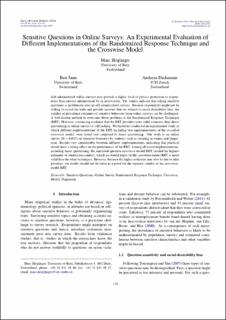Bitte benutzen Sie diese Kennung, um auf die Ressource zu verweisen:
https://doi.org/10.21256/zhaw-3171| Publikationstyp: | Beitrag in wissenschaftlicher Zeitschrift |
| Art der Begutachtung: | Peer review (Publikation) |
| Titel: | Sensitive questions in online surveys : an experimental evaluation of different implementations of the randomized response technique and the crosswise model |
| Autor/-in: | Höglinger, Marc Jann, Ben Diekmann, Andreas |
| et. al: | No |
| DOI: | 10.21256/zhaw-3171 10.18148/srm/2016.v10i3.6703 |
| Erschienen in: | Survey Research Methods |
| Band(Heft): | 10 |
| Heft: | 3 |
| Seite(n): | 171 |
| Seiten bis: | 187 |
| Erscheinungsdatum: | 12-Okt-2016 |
| Verlag / Hrsg. Institution: | European Survey Research Association |
| ISSN: | 1864-3361 |
| Sprache: | Englisch |
| Schlagwörter: | Crosswise model; Plagiarism; Randomized response technique; Sensitive question; Online survey |
| Fachgebiet (DDC): | 000: Allgemeines und Wissenschaft |
| Zusammenfassung: | Self-administered online surveys may provide a higher level of privacy protection to respondents than surveys administered by an interviewer. Yet, studies indicate that asking sensitive questions is problematic also in self-administered surveys. Because respondents might not be willing to reveal the truth and provide answers that are subject to social desirability bias, the validity of prevalence estimates of sensitive behaviors from online surveys can be challenged. A well-known method to overcome these problems is the Randomized Response Technique (RRT). However, convincing evidence that the RRT provides more valid estimates than direct questioning in online surveys is still lacking. We therefore conducted an experimental study in which different implementations of the RRT, including two implementations of the so-called crosswise model, were tested and compared to direct questioning. Our study is an online survey (N = 6,037) on sensitive behaviors by students such as cheating in exams and plagiarism. Results vary considerably between different implementations, indicating that practical details have a strong effect on the performance of the RRT. Among all tested implementations, including direct questioning, the unrelated-question crosswise-model RRT yielded the highest estimates of student misconduct, which we would expect if the crosswise-model RRT is more valid than the other techniques. However, because the higher estimates may also be due to false positives, our results should not be taken as a proof for the superior validity of the crosswise-model RRT. |
| Weitere Angaben: | Users can use, reuse and build upon the material published in the journal but only for non-commercial purposes and with proper attribution. |
| URI: | https://digitalcollection.zhaw.ch/handle/11475/17625 |
| Volltext Version: | Publizierte Version |
| Lizenz (gemäss Verlagsvertrag): | Lizenz gemäss Verlagsvertrag |
| Departement: | School of Management and Law |
| Organisationseinheit: | Winterthurer Institut für Gesundheitsökonomie (WIG) |
| Enthalten in den Sammlungen: | Publikationen School of Management and Law |
Dateien zu dieser Ressource:
| Datei | Beschreibung | Größe | Format | |
|---|---|---|---|---|
| Sensitive Questions 2016.pdf | 582.52 kB | Adobe PDF |  Öffnen/Anzeigen |
Zur Langanzeige
Höglinger, M., Jann, B., & Diekmann, A. (2016). Sensitive questions in online surveys : an experimental evaluation of different implementations of the randomized response technique and the crosswise model. Survey Research Methods, 10(3), 171–187. https://doi.org/10.21256/zhaw-3171
Höglinger, M., Jann, B. and Diekmann, A. (2016) ‘Sensitive questions in online surveys : an experimental evaluation of different implementations of the randomized response technique and the crosswise model’, Survey Research Methods, 10(3), pp. 171–187. Available at: https://doi.org/10.21256/zhaw-3171.
M. Höglinger, B. Jann, and A. Diekmann, “Sensitive questions in online surveys : an experimental evaluation of different implementations of the randomized response technique and the crosswise model,” Survey Research Methods, vol. 10, no. 3, pp. 171–187, Oct. 2016, doi: 10.21256/zhaw-3171.
HÖGLINGER, Marc, Ben JANN und Andreas DIEKMANN, 2016. Sensitive questions in online surveys : an experimental evaluation of different implementations of the randomized response technique and the crosswise model. Survey Research Methods. 12 Oktober 2016. Bd. 10, Nr. 3, S. 171–187. DOI 10.21256/zhaw-3171
Höglinger, Marc, Ben Jann, and Andreas Diekmann. 2016. “Sensitive Questions in Online Surveys : An Experimental Evaluation of Different Implementations of the Randomized Response Technique and the Crosswise Model.” Survey Research Methods 10 (3): 171–87. https://doi.org/10.21256/zhaw-3171.
Höglinger, Marc, et al. “Sensitive Questions in Online Surveys : An Experimental Evaluation of Different Implementations of the Randomized Response Technique and the Crosswise Model.” Survey Research Methods, vol. 10, no. 3, Oct. 2016, pp. 171–87, https://doi.org/10.21256/zhaw-3171.
Alle Ressourcen in diesem Repository sind urheberrechtlich geschützt, soweit nicht anderweitig angezeigt.